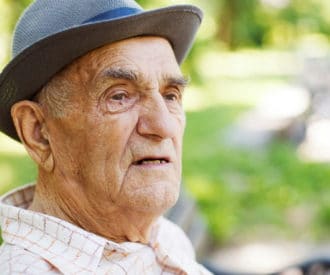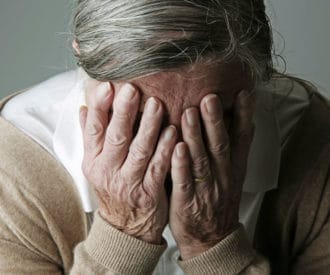
When someone has dementia, their existing health conditions and overall health shouldn’t be overlooked by doctors with tunnel vision. Dr. Leslie Kernisan of Better Health While Aging shares 5 top things she wants caregivers to know so they can get better healthcare for their older adult living with Alzheimer’s or dementia. Learn more about Dr. Kernisan »
Having dementia, such as Alzheimer’s, brings on special challenges when it comes to health and medical care.
A few years ago, my friend and colleague Paula Spencer Scott interviewed me on what family caregivers can do to improve the health – and healthcare – of a loved one affected by dementia.
The interview turned into a chapter in her terrific book, “Surviving Alzheimer’s: Practical tips and soul-saving wisdom for caregivers.”
Below, I share five things I wish more caregivers knew about better healthcare for someone with a diagnosis of Alzheimer’s or another dementia.
The following is an excerpt from Paula Spencer Scott’s new book “Surviving Alzheimer’s – Practical tips and soul-saving wisdom for caregivers.” I’ve added a few links to her text.
Geriatrician Leslie Kernisan, MD, urges you to shift how you think about medical care after an Alzheimer’s diagnosis; it can make a world of difference for your loved one and you.
#1: I wish dementia caregivers knew…that what seem like “little things” can make people much worse.
Untreated pain, constipation, too much novelty or stress, medication side effects – you don’t think they’re that big of a deal, but for an older adult, they can be huge.
Often these “little things” make a person with dementia much more confused or difficult than he’d otherwise be.
These seemingly minor problems can even wind up sending your loved one to the emergency room or hospital, which is a stressful and risky experience for someone with Alzheimer’s.
And that means another crisis you and the rest of your family will have to deal with.
Pay attention when a new problem develops, especially if it’s over hours or days.
Whether it’s something physical, behavioral, or with thinking skills, don’t automatically assign every change to the dementia. Make sure something else isn’t going on.
One of the biggest problems caregivers don’t always act on: Sudden worsening in mental abilities. This indicates delirium, which means there’s likely something wrong, like an infection.
Often a caregiver will mention to me at a scheduled exam, “She’s been much more confused in the past week.”
We often discover a urinary tract infection or medication side effect, but it’s not uncommon for us to find really serious medical problems underlying the new confusion.
In one case, we discovered a large pocket of pus next to an elderly woman’s lung, which explained her cognitive downturn.
Don’t wait a week. Don’t wait until the next appointment you have.
Call the doctor or advice-line that day, and be ready to bring her in today.
#2: I wish dementia caregivers knew…To have doctors re-evaluate the care plan for other chronic illnesses in light of a dementia diagnosis.
Most older adults have more things going on than the dementia. Many of these chronic illnesses require self-care that can get hard when you have memory loss and cognitive changes.
Common examples: People with insulin-requiring diabetes should be given a simplified insulin regimen.
It can also be hard for people with dementia to properly take “as-needed” medication, such as for pain or for COPD; instead the plan needs to be simplified, or you need to recruit more help to keep track of how the person is doing and how often they need to take the medication.
It’s not bad to simplify a care plan!
Most doctors can do this, but you have to ask for it because specialists, especially, are focused on the problem at hand for them.
Ask, “Is there anything we can simplify to make the care regimen more doable?”
Often, if this happens at all, it happens too late. That’s a mistake.
#3: I wish dementia caregivers would…get used to thinking about the real pros and cons for every aspect of care.
I call these the benefits and the burdens. Many treatments and procedures are overly burdensome to people with dementia and may be less likely to help than people realize.
Here’s a common scenario: Someone with dementia is found to have a mass that’s possibly cancer. The doctor wants to biopsy it and, if it’s cancer, offer whatever treatments are possible.
You’d want to ask: “How stressful will the evaluation and treatment (if necessary) be? What would happen if we just watched it? And what are the answers to these questions in light of this person’s overall health?”
If the person has been in and out of the hospital over the past couple of years due to congestive heart failure, for example, then a full-blown cancer work-up may not be the right thing to pursue.
For any major diagnostic procedure or treatment, ask, “How will this help with my loved one’s care overall? And what are the likely burdens?”
This is especially true for same-day treatments that involve sedatives or anesthesia. Often these tests and procedures are quite stressful and even risky for people with dementia, but many doctors don’t focus on this when they recommend the test.
So you really want to be clear on how the test results might help you better manage the person’s overall health.
Get the doctor to help you think about the big picture of the person’s health. Doctors won’t always remember to do this.
Specialists, especially, tend to focus on the specific problem you’ve brought to their attention and how to fix it.
They each focus on their own tree, and that can be to your detriment, because you need help with the whole forest. You need to know which are the trees to pay attention to most.
#4: I wish dementia caregivers knew…it’s really important to have somebody knowledgeable about the person with Alzheimer’s come to the medical visits.
Too often, people with mild dementia come alone. Sometimes it’s because they want to highlight their independence. Or it’s just plain hard for the caregiver to come in.
The trouble is, people with dementia often have difficulty providing doctors with enough information, or with details on a symptom or a problem.
This means important health issues can be missed or not get properly addressed.
Anybody, whether you have dementia or not, can have trouble remembering what the physician says. Everybody needs an advocate with them at doctor visits – but especially people with dementia.
What if the person doesn’t want you to come? Try to explain that you’d be helping them retain important information. But if they won’t let you, or you can’t be there, you have options.
At minimum, you can write up your questions and concerns and send it to the doctor before the appointment.
Some doctors have technology that allows caregivers to videoconference into the visit. Or you can ask the doctor to call during the visit or send back a summary in writing or via email.
Another approach is to sit in on part of the visit but also to step out for a bit so that the person with dementia gets some private time with the doctor.
#5. I wish dementia caregivers would…start the process of advance care planning with the doctor as soon as they get a diagnosis or know they’re dealing with dementia.
Good advance care planning should always start with conversation, reflection, and learning more about what to expect health-wise down the road.
And of course, because we want the person with dementia to be as involved as possible, earlier is always better.
To learn what to expect regarding dementia, consider watching videos online together of people with advanced dementia.
They can be hard to watch, but they’ve been shown to change the preferences that people express in their health planning.
Be sure to consider what other health problems, besides the dementia, might bring on a life-threatening crisis or cause real health declines.
The hard, overlooked reality: People with dementia often have other serious illnesses that may bring the end before dementia does.
For example, someone with advanced COPD who has a bad crisis and ends up on a breathing machine won’t be able to tell you his preferences, even if his Alzheimer’s is mild stage.
So it’s important to talk about how other major diagnoses are likely to evolve, while you can both discuss them.
Someone who has dementia and who’s on kidney dialysis eventually won’t understand why he’s being held down and poked, and probably won’t do well.
Ask for help understanding the overall health picture.
Not all doctors are comfortable helping families with advance care planning. If yours isn’t, try asking something like, “Before we do this paperwork, we’d like to review the overall medical picture and what conditions are most likely to affect him.”
Ask, “What might possibly happen in the next one to two years? What key medical decisions can I be expected to have to make in the next year or two?”
Revisit documents as the person’s health evolves – every time there’s a major change in health that changes the person’s abilities (like a stroke) or health trajectory (like a cancer diagnosis).
Repeated hospitalizations can also signal a time to reassess the advance directive; people may decide to prioritize different things as a person becomes frailer or sicker.
So often I have families tell me “Oh, my mother did her advance directive 10 years ago.” Well that was then!
Now that she’s in a different health situation, she – or her surrogate decision-maker – may have different ideas on what should be done in the event of a serious health crisis or if it seems some form of life support may be needed.
Of course no one likes to think about health crises and how our loved ones might die. But in the long run, this can really reduce the stress on caregivers.
One study showed that when families end up making decisions at the end of a loved one’s life, the negative stress effects from factors like uncertainty and the logistics of decision making can last for months or years; advanced directives specifying treatment reduced caregiver stress.
Plus, it’s important to try to honor a person’s wishes and preferences at the end-of-life.
Planning gives people a way to think about those wishes, share their thoughts with loved ones, and document them so that doctors later have guidance on what to do.
Recommended for you:
- 12 Best Alzheimer’s and Dementia Books for Caregivers
- How to Understand and Manage Dementia Behaviors: A Comprehensive Guide
- 6 Ways to Help Someone Who Doesn’t Know They’re Ill: Anosognosia in Dementia
This article wasn’t sponsored and doesn’t contain affiliate links. For more information, see How We Make Money.




